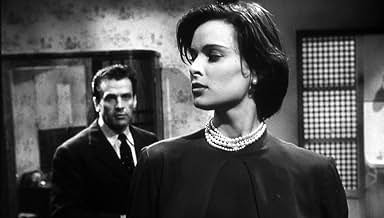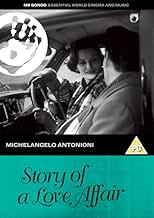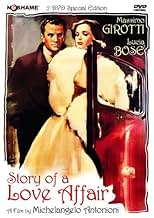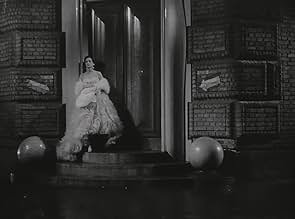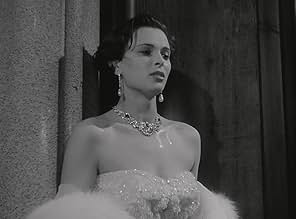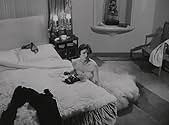IMDb रेटिंग
7.1/10
3.7 हज़ार
आपकी रेटिंग
अपनी भाषा में प्लॉट जोड़ेंPaola is a young, beautiful woman married to a wealthy entrepreneur. She meets her former lover Guido after seven years, but their relationship is marked by tragic events.Paola is a young, beautiful woman married to a wealthy entrepreneur. She meets her former lover Guido after seven years, but their relationship is marked by tragic events.Paola is a young, beautiful woman married to a wealthy entrepreneur. She meets her former lover Guido after seven years, but their relationship is marked by tragic events.
- पुरस्कार
- 2 जीत और कुल 1 नामांकन
Rubi Dalma
- L'amica snob di Paola
- (as Rubi D'Alma)
Rosi Mirafiore
- La cameriera del bar
- (as Rosi Mirafiori)
Franco Fabrizi
- Il presentatore della sfilata di moda
- (बिना क्रेडिट के)
फ़ीचर्ड समीक्षाएं
Although Antonioni was part of the Italian Nouvelle Vague ,like Fellini,he began as a director of the neorealism school.He did not cut,however, the best of De Sica ,Rossellini and Visconti.
Best part comes from a sensitive Massimo Girotti but he's not really given a scene to shine -as he had in Visconti's "Ossessione" -.Lucia Bosé gives a good but a bit icily impersonal performance.
"Cronaca di un amore" is an interesting movie,if only for the things it forecasts: -the screenplay takes the shape of a private investigation,predating by ten years the second part of "l'avventura" and "blow-up" -the scenes displaying wealthy people living in luxury and exchanging futile conversations will be fully developed in "la Notte" But the most interesting subject is responsibility.Is a crime we intend to commit really a crime?This subject was rarely treated in Italian cinema ."Blow up" will come back to appearances .
Best part comes from a sensitive Massimo Girotti but he's not really given a scene to shine -as he had in Visconti's "Ossessione" -.Lucia Bosé gives a good but a bit icily impersonal performance.
"Cronaca di un amore" is an interesting movie,if only for the things it forecasts: -the screenplay takes the shape of a private investigation,predating by ten years the second part of "l'avventura" and "blow-up" -the scenes displaying wealthy people living in luxury and exchanging futile conversations will be fully developed in "la Notte" But the most interesting subject is responsibility.Is a crime we intend to commit really a crime?This subject was rarely treated in Italian cinema ."Blow up" will come back to appearances .
Antononoi's first feature film deals with a jealous husband looking into the past of his wife, Paola, via private investigator, which inadvertently gets her back together with an old lover, Guido, who unlike the rich wife, is a poor, barely scraping by car salesman. Although the two seem to be in love with each other, the difference in economic status and Paola's marriage keep them apart. Also looming over them is the shadow of an "accident" they feel responsible for.
Many have called this a sort of noir, and it's easy to see why. Paola could be seen as bordering the line of a femme fatale, there's the past catching up, the grey morality of the characters, etc. However if one were to watch this alongside noirs like Double Indemnity, Laura, and Out of the Past, they would fine "Story of a Love Affair" feels completely different, and besides these tropes, hardly feels like a noir. It would be safer to say the film has noir elements.
Like a number of Antononoi's later works, the film deals with alienation, as well as the bourgeoise. The disenfranchised characters who easily fall into damning passions is present here. The plot is very intricate and the film is carried by mostly dialogue, as opposed to later films where imagery would play more prominence. Although not as grandiose as the cinematography from films like "The Adventure" and "la Notte", his touches can certainly be seen in this splendidly crafted first film.
Thankfully, the writing and characterization is more than enough to carry things here. The multitude of plot threads, characters and themes are woven masterfully, and while not featuring the most sympathetic characters in the world, they are certainly fascinating ones, and that's enough.
If you can find this and are a fan of these kinds of films, it's well worth checking out.
Many have called this a sort of noir, and it's easy to see why. Paola could be seen as bordering the line of a femme fatale, there's the past catching up, the grey morality of the characters, etc. However if one were to watch this alongside noirs like Double Indemnity, Laura, and Out of the Past, they would fine "Story of a Love Affair" feels completely different, and besides these tropes, hardly feels like a noir. It would be safer to say the film has noir elements.
Like a number of Antononoi's later works, the film deals with alienation, as well as the bourgeoise. The disenfranchised characters who easily fall into damning passions is present here. The plot is very intricate and the film is carried by mostly dialogue, as opposed to later films where imagery would play more prominence. Although not as grandiose as the cinematography from films like "The Adventure" and "la Notte", his touches can certainly be seen in this splendidly crafted first film.
Thankfully, the writing and characterization is more than enough to carry things here. The multitude of plot threads, characters and themes are woven masterfully, and while not featuring the most sympathetic characters in the world, they are certainly fascinating ones, and that's enough.
If you can find this and are a fan of these kinds of films, it's well worth checking out.
The feature film debut of future Italian cinema star Michelangelo Antonioni is quite conventional and straightforward as compared to his later works, which are generally regarded as masterpieces. Though not in that category, this film ranks as a very well-made melodrama that dares to also include exploration of the darkest of human desires, specifically within the context of marriage and fidelity.
Chance also plays a large role here, helping to reunite former lovers who pick up where they left off, ironically thanks to the woman's husband hiring a private detective to follow her as he suspects she is having an affair. What follows is often high-strung, dense and very moving as Antonioni shows us the most desolate shots of the beautiful city Milan. Many of the establishing shots are long shots of corridors, streets and other walkways that create great sense of alienation, isolation and illicit activities. The ending may require a bit of explaining but still fits the overall tone of elegy and bitter sadness. A powerful and moving Italian melodrama that certainly could be used as a template for American filmmakers today.
Chance also plays a large role here, helping to reunite former lovers who pick up where they left off, ironically thanks to the woman's husband hiring a private detective to follow her as he suspects she is having an affair. What follows is often high-strung, dense and very moving as Antonioni shows us the most desolate shots of the beautiful city Milan. Many of the establishing shots are long shots of corridors, streets and other walkways that create great sense of alienation, isolation and illicit activities. The ending may require a bit of explaining but still fits the overall tone of elegy and bitter sadness. A powerful and moving Italian melodrama that certainly could be used as a template for American filmmakers today.
This is Antonioni's first feature. Released in 1950, it seems to me both a harbinger of the auturer's mature style while also being a semi- remake, semi- rebuke of Double Indemnity., from only a few years prior. .
There is an extraordinary shot in this film, pure Antonioni, when the lovers meet on a bridge. The view is 360 degrees, we're not sympathizing with one lover more than the other. As the camera moves around its axis, our focus goes much beyond our traditionally intended targets as ship workers in the distance cohabitate the deepest focus with the characters we are following, who bicker over the merits of violating social morality.
If Double Indemnity is fatalistic, this work is nihilistic. If traditional Noir-narrative leads to certain doom, this story leads to only one finality, and that is the randomness and chaos of life, death and love. In that way, this work reminded me most of Woody Allen's late- career "thrillers"-Match Point and Cassandra's Dream.
There is an extraordinary shot in this film, pure Antonioni, when the lovers meet on a bridge. The view is 360 degrees, we're not sympathizing with one lover more than the other. As the camera moves around its axis, our focus goes much beyond our traditionally intended targets as ship workers in the distance cohabitate the deepest focus with the characters we are following, who bicker over the merits of violating social morality.
If Double Indemnity is fatalistic, this work is nihilistic. If traditional Noir-narrative leads to certain doom, this story leads to only one finality, and that is the randomness and chaos of life, death and love. In that way, this work reminded me most of Woody Allen's late- career "thrillers"-Match Point and Cassandra's Dream.
The very first feature film of Michelangelo Antonioni, Story of a Love Affair as introduced by Lorenzo Codelli, was a film that dealt with the metaphysics, and had very little neo-realist elements which was a departure from what one would come to expect from a filmmaker whose documentaries were neo-realist. Watching it for the first time, I thought it would make a wonderful thriller/crime-mystery involving two lovers, and I suppose in the hands of Hollywood, we would get just that.
But this is not Hollywood we're talking about, so again I get to throw all standard notions I was weaned on out of the window. As I was warned by a friend, I would be in for a rough ride because whatever structure of story-telling I was familiar with was going to be challenged, and strangely enough, I am beginning to find this challenge quite liberating, like the hitting onto a goldmine or an oilfield, and just raking in the sights and sounds from how beautiful a black and white movie could be, in terms of story, and characters.
However, the characters need not be goody-two-shoes, or perfectly looking beings with zilch problems that they couldn't take care of within 2 hours. There are some serious and complex issues that the leads here have to grapple with, and together with an audience, we try and probe, and discover for ourselves just what those are, though naturally we aren't given all the answers on a sliver platter, and have to work hard at it, sometimes even utilizing some precious moments to breathe, digest, and compute, only being able to scratch the surface.
Whatever the story or mystery is, it never really got addressed, not directly anyway. But story aside, I was really intrigued by the lead characters. We have a beautiful married woman Paola Fontana (played by Lucia Bose whom we'll see later in another Antonioni movie, and at one time the reigning Miss Italy) who seem to have the best of what luxuries life can offer, but is stuck in a loveless marriage to a rich man Enrico (Ferdinando Sarmi). We're told that in her youth, she was a head turner, and almost always changes her boyfriends, each being the alpha-male type.
Surprisingly, her lover whom she maintains contact with, Guido (Massimo Girotti) is anything but an alpha-male type. In fact, I would call him a loser in the classic sense of the word. No real job and penniless, he has some magnetic qualities to be be able to mesmerize Paola into trysts in cheap motel rooms. Meeting on the sly, we see how a high society woman have to dodge around from being discovered, and setting up alibis just to meet Guido, and we soon learn how wicked a woman she can be, for coming up with plans for crime to be committed to get things done her way. Which brings us back to the original thought of how she was involved in a more heinous crime / accident, where she could well be the chief manipulator then made to be seen as the victim.
The main crime thread that got weaved into the story, was one involving a certain unseen Ms Giovanna, whose demise was linked to the two lovers. We never really learned what exactly happened, and Antonioni makes us work in order to try and piece clues and accounts together. And the probing of this mystery by a private investigator serves as a catalyst to the rest of the story, where we first see our lovers meet after a long while, but instead of enjoying each other's embrace, seem a lot more concerned with the PI's probe, as if afraid that it'll uncover hidden skeletons in their closets.
Story of a Love Affair becomes an examination into these 2 characters, and interesting enough, to dwell on the problems that they face, in a somewhat lose-lose situation throughout their relationship. The first was when Giovanna served to be in the way of their coming together, being an in-between, and when that's settled, there's the other more pressing issue of whether they can elope successfully, where pragmatism takes over romanticism with Guido knowing for sure that he has no money, and little means to support both of them, especially the lifestyle that Paola currently enjoys.
Definitely deserves a second viewing to try and develop my thoughts on it further! And to enjoy the beautiful score all over again too!
But this is not Hollywood we're talking about, so again I get to throw all standard notions I was weaned on out of the window. As I was warned by a friend, I would be in for a rough ride because whatever structure of story-telling I was familiar with was going to be challenged, and strangely enough, I am beginning to find this challenge quite liberating, like the hitting onto a goldmine or an oilfield, and just raking in the sights and sounds from how beautiful a black and white movie could be, in terms of story, and characters.
However, the characters need not be goody-two-shoes, or perfectly looking beings with zilch problems that they couldn't take care of within 2 hours. There are some serious and complex issues that the leads here have to grapple with, and together with an audience, we try and probe, and discover for ourselves just what those are, though naturally we aren't given all the answers on a sliver platter, and have to work hard at it, sometimes even utilizing some precious moments to breathe, digest, and compute, only being able to scratch the surface.
Whatever the story or mystery is, it never really got addressed, not directly anyway. But story aside, I was really intrigued by the lead characters. We have a beautiful married woman Paola Fontana (played by Lucia Bose whom we'll see later in another Antonioni movie, and at one time the reigning Miss Italy) who seem to have the best of what luxuries life can offer, but is stuck in a loveless marriage to a rich man Enrico (Ferdinando Sarmi). We're told that in her youth, she was a head turner, and almost always changes her boyfriends, each being the alpha-male type.
Surprisingly, her lover whom she maintains contact with, Guido (Massimo Girotti) is anything but an alpha-male type. In fact, I would call him a loser in the classic sense of the word. No real job and penniless, he has some magnetic qualities to be be able to mesmerize Paola into trysts in cheap motel rooms. Meeting on the sly, we see how a high society woman have to dodge around from being discovered, and setting up alibis just to meet Guido, and we soon learn how wicked a woman she can be, for coming up with plans for crime to be committed to get things done her way. Which brings us back to the original thought of how she was involved in a more heinous crime / accident, where she could well be the chief manipulator then made to be seen as the victim.
The main crime thread that got weaved into the story, was one involving a certain unseen Ms Giovanna, whose demise was linked to the two lovers. We never really learned what exactly happened, and Antonioni makes us work in order to try and piece clues and accounts together. And the probing of this mystery by a private investigator serves as a catalyst to the rest of the story, where we first see our lovers meet after a long while, but instead of enjoying each other's embrace, seem a lot more concerned with the PI's probe, as if afraid that it'll uncover hidden skeletons in their closets.
Story of a Love Affair becomes an examination into these 2 characters, and interesting enough, to dwell on the problems that they face, in a somewhat lose-lose situation throughout their relationship. The first was when Giovanna served to be in the way of their coming together, being an in-between, and when that's settled, there's the other more pressing issue of whether they can elope successfully, where pragmatism takes over romanticism with Guido knowing for sure that he has no money, and little means to support both of them, especially the lifestyle that Paola currently enjoys.
Definitely deserves a second viewing to try and develop my thoughts on it further! And to enjoy the beautiful score all over again too!
क्या आपको पता है
- ट्रिवियाMichelangelo Antonioni's feature film directorial debut. He wanted to cast Gene Tierney as Paola, but since he was an unknown European director he could not get her. Eventually he met then 19 year old Lucia Bosè, who had been Miss Italy 1947, while having lunch at fellow director Luchino Visconti's house. While initially skeptical over her maturity, Visconti convinced him to audition her.
- गूफ़After Paola says, "Leave me alone," the camera moves to follow her as she collapses onto her bed. In the upper right corner of the frame, a white drape can be briefly seen before it is pulled out of the path of the camera.
- कनेक्शनFeatured in Marco Ferreri 1928 - 1997 (2008)
टॉप पसंद
रेटिंग देने के लिए साइन-इन करें और वैयक्तिकृत सुझावों के लिए वॉचलिस्ट करें
- How long is Story of a Love Affair?Alexa द्वारा संचालित
विवरण
बॉक्स ऑफ़िस
- दुनिया भर में सकल
- $528
- चलने की अवधि1 घंटा 38 मिनट
- रंग
- पक्ष अनुपात
- 1.37 : 1
इस पेज में योगदान दें
किसी बदलाव का सुझाव दें या अनुपलब्ध कॉन्टेंट जोड़ें



